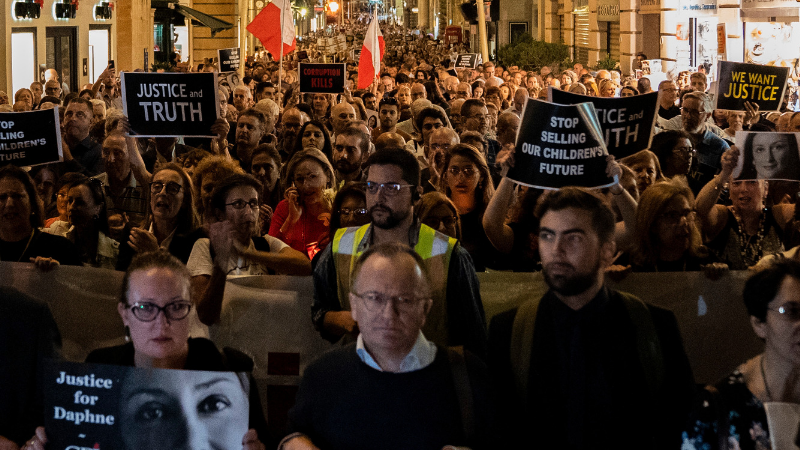In Malta, where everything is upside down and topsy-turvy, this guide is designed as a brief induction into the operational methods of the smallest State in the EU. The ideal dummy is visualised as a foreigner, an outsider, a barrani, a person of European origin who’s been instilled with European values since birth. Our weekly articles are aimed at helping you to (somehow) get ‘Malta’.
In a democracy, openness is key. Transparency ensures that all affairs of the State can be scrutinised by the people whose interests a government serves.
Free and fair elections occur without the intrusion of government-controlled media or interference from those with a vested interest in selling passports and citizenship to the highest bidders. Ideally, the electorate is provided with a decent standard of education.
Democracy facilitates the active participation of all its citizens in public life and protects their rights, also guaranteed under international law. Likewise, the rule of law further protects us, establishing that no-one is above the law – no matter their political position or social status or, in Malta, their familial connections – that the government’s powers are kept in check, and that justice is administered through mechanisms wholly independent of the government.
In a democracy, the rule of law ensures that corruption is punished by independent courts and no government official can violate the limits placed on the power of government. In this week’s instalment of the Dummies’ Guide, we test this premise in relation to the smallest EU nation state – Malta.
On the same day as the assassination of Daphne Caruana Galizia, her husband and sons were forced to wait for hours in the law courts in order to have the presiding magistrate, Consuelo Scerri Herrera, removed from the murder inquiry.
The magistrate, who is the sister of the Environment Minister, was frequently criticised by the assassinated journalist for her grossly inappropriate behaviour, and yet she was promoted to the position of judge earlier this year. It was a controversial move given her original nomination had been turned down by the judicial appointments committee.
Several ingredients antithetical to the rule of law are clearly visible: familial connections; clear links with and interference by the government (the Prime Minister himself said she should have been made a judge years ago); the absence of basic humanity displayed to a traumatised family whose wife and mother had been vilified for years before finally – and that same day – being deprived of her right to life.
Despite the Deputy Prime Minister’s repetitive insistence on the ‘rule of law’ in an interview with veteran journalist Tim Sebastian, the EU’s rule of law delegation has visited Malta three times since the assassination, expressing increasingly serious concerns each time. Their last visit came just days after the barricading of the makeshift memorial to Caruana Galizia on the orders of the Minister for Justice and Culture.
Last week, a year since the journalist’s murder, six international press freedom NGOs arrived in Malta. Flowers and candles placed at the barricaded memorial by representatives of international organisations defending journalistic freedom were gone the following morning.
Freedom of expression and the right to protest – both staple elements of any democracy – were further undermined when, on 19 October, all signs of peaceful protest placed by demonstrators to mark the one year anniversary of the assassination were yet again removed on government orders.
This same Friday, shortly after the NGOs had left Malta, the Minister for Justice and Culture responsible for clearing the boarded-up memorial, published an article with the ironic title, ‘A democratic society’. Here, he claims that ‘Malta is committed to upholding human rights, freedom of speech, the protection of journalists and the rule of law.’
This piece appeared on the same day as a letter from PEN International to the Minister of Justice: ‘We are dismayed…to learn this morning that the tributes…laid by the people of Malta and our delegation have been removed on the order of the Ministry for Justice. We believe this is an unacceptable violation of the rights to freedom of expression and peaceful protest.’
The findings of the NGOs’ mission to Malta also appeared the same day:
‘Malta, a democracy and member of the European Union and the Council of Europe, is not living up to its obligations to guarantee and safeguard freedom of expression and press freedom as required by Maltese law and international instruments including the European Convention on Human Rights.’
This week, Tourism Minister Konrad Mizzi and Chief of Staff Keith Schembri – both facing money laundering allegations – refused to meet Pieter Omtzigt, PACE Special Rapporteur on Caruana Galizia’s assassination and the rule of law. This follows the Malta government’s failed attempts to have Omtzigt removed from his post.
Democracy holds power to account. In Malta, as in a dictatorship, the government is brazenly unaccountable. The sight of a boarded-up monument suppressing the site of protest is intensified when, day after day, this space is stripped of all symbols of resistance by the government itself.
Ultimately, as the European Commission makes clear, “If journalists are silenced, so is democracy.”












